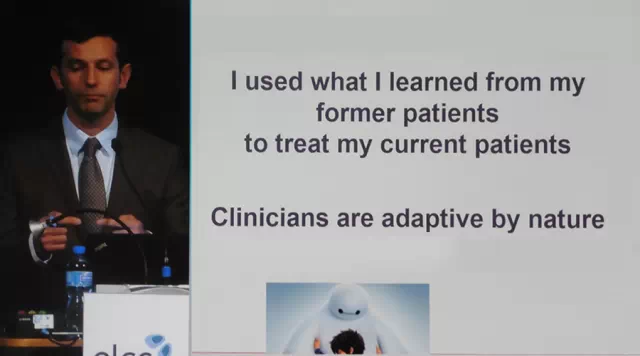ELCC 2015的4月17日程中设计了一个投票环节:“适应性设计是否适用于肺癌临床试验(can adaptive design help to proceed in clinical trials)?
ELCC 2015的4月17日程中设计了一个投票环节:“适应性设计是否适用于肺癌临床试验(can adaptive design help to proceed in clinical trials)?投票环节的流程为:①第一次投票,投票者选择答案有Yes(是)、 No(否)、 Don’t Know(不知道)三种; ②正反双方辩论;③第二次投票。《肿瘤瞭望》特别为您再现投票结果和辩论精华。

(摄影:张宇)
临床试验的设计中出现了现代创新——适应性设计,即根据累积信息来修正试验。适应性设计(adaptive design)是一种临床试验设计方法,此方法允许在试验启动后在不改变试验的有效性和完整性的情况下,适当修改试验方案的某些方面(An adaptive design is one that allows adaptations in trial procedures and/or statistical procedures after initiation of the trial without undermining the validity and integrity of the trial)。
有10类常见适应性设计: ①适应性随机化设计(adaptive randomization design);②适应性成组序贯设计(adaptive group sequential design);③可变的样本量重估设计(flexible sample size re-estimation design);④舍弃较差组设计(drop-the-losers design);⑤适应性剂量发现设计(adaptive dose-finding design);⑥生物标记物适应性设计(biomarker- adaptive design);⑦适应性治疗转换设计(adaptive treatment-switching design);⑧适应性假设设计(adaptive-hypotheses design);⑨两阶段无缝连接适应性设计(phase Ⅰ/Ⅱ[orⅡ/Ⅲ]adaptive seamless trial design);⑩多阶段适应性设计(multiple adaptive design)。
正方观点
正方辩论专家为Benjamin BESSE,MD,PhD(图1)。他从临床医生的角度出发,提出“支持适应性设计用于肺癌临床试验”的理由,适应性设计可以:①纠正起初的错误假设(correct wrong assumptions made at the beginning);②较早地给予患者最有前景的治疗选项(select earlier the most promising option);③使用试验以外的新信息(use new information outside of the trial);④对意外早做反应(react earlier to surprises[either + or -]);⑤加速开发进程(speed up the development process)。

反方观点
反方辩论专家M. Buyse, MD(图2)分析了Battle试验和Lung-Map试验,引用Anastasios A. Tsiatis的文章“临床试验应用适应性设计的效率低(On the inefficiency of the adaptive design for monitoring clinical trials)”,Edward L.Korn和Boris Freidlin的文章“结果适应性随机有用吗(Outcome-Adaptive Randomization: Is It Useful)?”,及Spencer Phillips Hey和Jonathan Kimmelman的文章“结果适应性分组试验符合伦理规范吗(Are outcome-adaptive allocation trials ethical)?”,反驳了“当生物标志物可用、一次检验多种治疗方式、使试验更符合伦理规范、获得更高效率、加速开发进程”时适应性设计有必要/有用”的观点。

投票结果
1、在有特定分子改变的患者中进行药物分析时,临床试验采用适应性设计是有用的(Adaptive design in clinical trials is useful when a certain drug is analyzed in patients with a specific molecular alteration)
是(第一次投票61.8%/第二次投票52.6%)、否(第一次投票5.5/第二次投票35.5%)、不知道(第一次投票32.7%/第二次投票11.8%)
2、在注册/关键性随机试验中,适应性设计有用(Adaptive design in clinical trial is useful in registration/pivotal randomized trials)
是(35.1%/ 17.9%)、否(36.8/65.5%)、不知道(28.1%/16.7%)
3、临床试验中适应性设计可减少新化合物审批时间(Adaptive design in clinical trial will reduce the time needed to approve a novel compound)
是(66.7%/ 46.1%)、否(17.5/34.8%)、不知道(15.8%/19.1%)
4、临床试验中适应性设计可增加试验结果为阳性的可能(Adaptive design in clinical trial will increase the probability of positive studies)
是(51.6%/ 49.4%)、否(30.6/40.2%)、不知道(17.7%/10.3%)
5、相比1:1随机,临床试验中适应性随机更符合伦理规范(Adaptive randomization in clinical trials is ethically preferable to 1:1 randomization)
是(45.3%/ 39.5%)、否(21.9/50%)、不知道(32.8%/10.5%)
6、相比简单设计的临床试验,适应性设计的临床试验结果更难以解读(The result of in clinical trials using adaptive designs are more difficult to interpret than the results of simpler designs)
是(56.3%/ 83.9%)、否(31.3/13.8%)、不知道(12.5%/2.3%)
7、回答同样的临床问题,适应性设计的研究需要的患者例数更少(Adaptive designs use fewer patients to answer the same clinical questions)
是(63.5%/ 62.7%)、否(17.3/25.3%)、不知道(19.2%/12%)
8、适应性设计更易实施(Adaptive designs are easier to conduct in practice)
是(23.9%/25.6%)、否(53.7/67.4%)、不知道(22.4%/7%)
9、自适应设计适用于所有阶段的药物开发(Adaptive designs are appropriate for all phase drug development)
是(21.7%/14%)、否(61.7/75.6%)、不知道(16.7%/10.5%)





 京公网安备 11010502033352号
京公网安备 11010502033352号